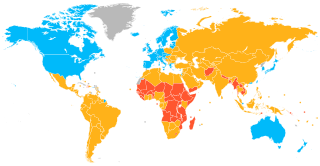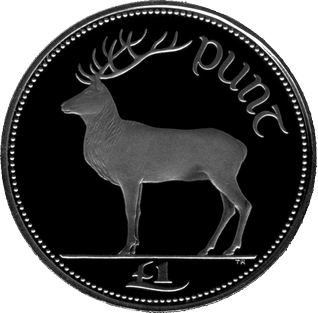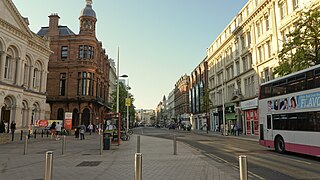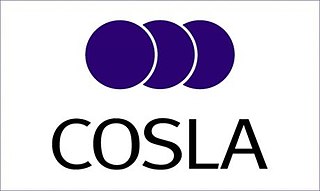Related Research Articles

A developed country, or advanced country, is a sovereign state that has a high quality of life, developed economy, and advanced technological infrastructure relative to other less industrialized nations. Most commonly, the criteria for evaluating the degree of economic development are the gross domestic product (GDP), gross national product (GNP), the per capita income, level of industrialization, amount of widespread infrastructure and general standard of living. Which criteria are to be used and which countries can be classified as being developed are subjects of debate. Different definitions of developed countries are provided by the International Monetary Fund and the World Bank; moreover, HDI ranking is used to reflect the composite index of life expectancy, education, and income per capita. In 2023, 40 countries fit all four criteria, while an additional 19 countries fit three out of four.
The Barents Region is a name given, by advocates of establishing international cooperation after the fall of the Soviet Union, to the land along the coast of the Barents Sea, from Nordland county in Norway to the Kola Peninsula in Russia and beyond all the way to the Ural Mountains and Novaya Zemlya, and south to the Gulf of Bothnia of the Baltic Sea and the great lakes Ladoga and Onega. Among the projects is the Barents Road from Bodø in Norway through Haparanda in Sweden and Finland to Murmansk in Russia. The region has six million inhabitants on 1.75 million km2; three quarters of both belong to Russia.

Translink is the brand name of the Northern Ireland Transport Holding Company (NITHCo), a public corporation providing public transport in Northern Ireland. NI Railways, Ulsterbus, Goldliner, Metro and Glider are all part of Translink. It is led by CEO Chris Conway.
The North/South Ministerial Council (NSMC) is a body established under the Good Friday Agreement to co-ordinate activity and exercise certain governmental powers across the whole island of Ireland.

The economy of Europe comprises about 748 million people in 50 countries.
In Canada, the Regional Development Agencies (RDA) are the seven federal government agencies responsible for addressing key economic challenges and furthering economic development, diversification, and job creation specific to their respective regions.
In the United Kingdom, regional development agencies (RDAs) were nine non-departmental public bodies established for the purpose of development, primarily economic, of England's Government Office regions between 1998 and 2010. There was one RDA for each of the NUTS level 1 regions of England. Similar activities were carried out in Wales by the Welsh Government Department of Economy and Transport, in Northern Ireland by the Department of Enterprise, Trade and Investment and in Scotland by Scottish Enterprise and Highlands and Islands Enterprise.

The economic history of the Republic of Ireland effectively began in 1922, when the then Irish Free State won independence from the United Kingdom. The state was plagued by poverty and emigration until the 1960s when an upturn led to the reversal of long term population decline. However, global and domestic factors combined in the 1970s and 1980s to return the country to poor economic performance and emigration. The 1990s, however saw the beginning of unprecedented economic success, in a phenomenon known as the "Celtic Tiger", which continued until the 2008 global financial crisis, specifically the post-2008 Irish economic downturn. It also led to Ireland becoming the most indebted state in the European Union. As of 2015, the Republic has returned to growth, and was the fastest growing economy for that year. In May 2023, Irish unemployment was at a record low of 3.8%.
The Ulster-Scots Agency is a cross-border body for Ireland which seeks to "promote the study, conservation and development of Ulster-Scots as a living language, to encourage and develop the full range of its attendant culture, and to promote an understanding of the history of the Ulster-Scots [people]."

The Republic of Ireland–United Kingdom border, sometimes referred to as the Irish border or British–Irish border, runs for 499 km (310 mi) from Lough Foyle in the north-west of Ireland to Carlingford Lough in the north-east, separating the Republic of Ireland from Northern Ireland.
A Commerce minister is a position in many governments that is responsible for regulating external trade and promoting economic growth. In many countries, this role is separate from a finance minister, who has more budgetary responsibilities.

The economy of Northern Ireland is the smallest of the four constituents of the United Kingdom and the smaller of the two jurisdictions on the island of Ireland. At the time of the Partition of Ireland in 1922, and for a period afterwards, Northern Ireland had a predominantly industrial economy, most notably in shipbuilding, rope manufacture and textiles, but most heavy industry has since been replaced by services. Northern Ireland's economy has strong links to the economies of the Republic of Ireland and Great Britain.

The Convention of Scottish Local Authorities (COSLA) is the national association of Scottish councils and acts as an employers' association for its 32 member authorities.
Universities Ireland is an organisation that promotes collaboration and co-operation between universities in both the Republic of Ireland and Northern Ireland. It was launched in July 2003 by the nine university presidents on the island of Ireland, with Professor Gerry McKenna, Vice Chancellor and President of the University of Ulster, as founding chair. It is funded by the member universities themselves; the Department of Education in the Republic of Ireland; the Department for Employment and Learning in Northern Ireland; and InterTradeIreland, an all-island body under the North/South Ministerial Council.

Since at least 1542, England and later Great Britain and Ireland have been connected politically, reaching a height in 1801 with the creation of the United Kingdom of Great Britain and Ireland. About five-sixths of the island of Ireland seceded from the United Kingdom in 1922 as the Irish Free State. Historically, relations between the two states have been influenced heavily by issues arising from their shared history, the independence of the Irish Free State and the governance of Northern Ireland. These include the partition of Ireland and the terms of Ireland's secession, its constitutional relationship with and obligations to the UK after independence, and the outbreak of political violence in Northern Ireland. Additionally, the high level of trade between the two states, their proximate geographic location, their common status as islands in the European Union until Britain's departure, common language and close cultural and personal links mean political developments in both states often closely follow each other.

The Good Friday Agreement (GFA) or Belfast Agreement is a pair of agreements signed on 10 April 1998 that ended most of the violence of the Troubles, an ethno-nationalist conflict in Northern Ireland since the late 1960s. It was a major development in the Northern Ireland peace process of the 1990s. It is made up of the Multi-Party Agreement between most of Northern Ireland's political parties, and the British–Irish Agreement between the British and Irish governments. Northern Ireland's present devolved system of government is based on the agreement.
The Irish Association for Cultural, Economic and Social Relations is a membership-driven forum for the shared concerns of a wide range of organisations and individuals involved in North–South Irish affairs.
The Global Forum on Migration and Development (GFMD) is a state-led, informal and non-binding process, which helps shape the global debate on migration and development. It provides a flexible, multi-stakeholder space where governments can discuss the multi-dimensional aspects, opportunities and challenges related to migration, development, and the link between these two areas. The GFMD process allows governments - in partnership with civil society, the private sector, the UN system, and other relevant stakeholders – to analyze and discuss sensitive issues, create consensus, pose innovative solutions, and share policy and practices.

A pastoral society is a social group of pastoralists, whose way of life is based on pastoralism, and is typically nomadic. Daily life is centered upon the tending of herds or flocks.

The Department for Business, Energy, and Industrial Strategy (BEIS) was a ministerial department of the United Kingdom Government, from July 2016 to February 2023.